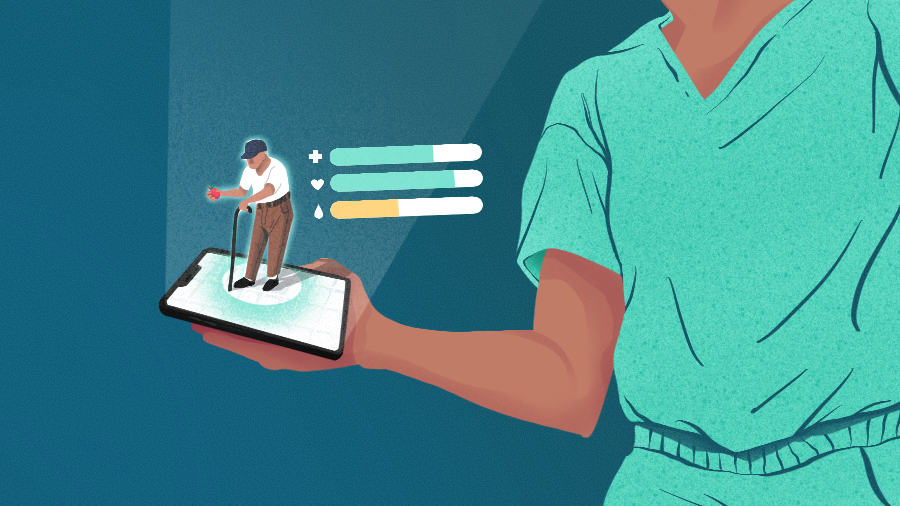7 Deadly Emotions of Caregiving
By Paula Spencer Scott, Caring.com contributing editor
Nobody would ever choose a smiley face as the perfect symbolic emoticon for a caregiver. Caregiving for an ailing loved one is just too stressful -- often triggering damaging emotions that can not only undermine your good work but harm your health, as well. Here's how to cope:
Caregiver Emotion Trap #1: Guilt
Guilt is virtually unavoidable as you try to "do it all."
What causes guilt: Guilt stems from doing or saying what you believe is the wrong thing, not doing what you perceive to be enough, or otherwise not behaving in the "right" way, whether or not your perceptions are accurate. Caregivers often burden themselves with a long list of self-imposed "oughts," "shoulds," and "musts." A few examples: I must avoid putting Mom in a nursing home. I ought to visit every day. I shouldn't lose my temper with someone who has dementia.
Risks of guilt: Caregiver guilt is an especially corrosive emotion because you're beating yourself up over faults that are imagined, unavoidable -- or simply human. That's counterproductive at a time when you need to be your own best advocate.
What you can do: Lower your standards from ideal to real; aim for a B+ in the many aspects of your life rather than an across-the-board A+. When guilt nags, ask yourself what's triggering it:
A rigid "ought"? An unrealistic belief about your abilities? Above all, recognize that guilt is virtually unavoidable. Because your intentions are good but your time, resources, and skills are limited, you're just plain going to feel guilty sometimes -- so try to get comfortable with that gap between perfection and reality instead of beating yourself up over it.
Caregiver Emotion Trap #2: Resentment
This emotion is still so taboo that many caregivers are loathe to admit to it.
What causes resentment: Caregivers often feel put-upon and upset because of imagined slights by others, including siblings and adult children who don't do enough to help. Caregiver resentment is especially felt toward the person being cared for, when the caregiver's life feels hijacked by responsibility and out of his or her own control.
Risks of resentment: Without enough support or noncaregiving outlets, feelings of being ignored, abandoned, or criticized can fester into anger and depression.
What you can do: Simply naming this tricky emotion to a trusted confidante can bring some release. Try venting to a journal or anonymous blog. Know that resentment is a very natural and common response to long-term caregiving, especially if your work life, marriage, health, or outside activities are compromised as a result. Know, too, that you can feel this complicated emotion yet still be a good person and a good caregiver.
Caregiver Emotion Trap #3: Anger
Some people outwardly show their anger more than others, but almost no one is never angry.
What causes anger: We get mad for reasons both direct (a balky loved one, an unfair criticism, one too many mishaps in a day) and indirect (lack of sleep, frustration over lack of control, pent-up disappointment).
Risks of anger: Chronic anger and hostility have been linked to high blood pressure, heart attack and heart disease, digestive-tract disorders, and headaches. Anger that builds up unexpressed can lead to depression or anxiety, while anger that explodes outward can jeopardize relationships and even harm others. Managing caregiver anger not only helps your well-being but makes you less likely to take out your fury on your loved one.
What you can do: Rather than trying to avoid anger, learn to express it in healthy ways. Simple deep-breathing exercises can channel mounting anger into a calmer state, for example. Talk yourself down with soothing chants: It's okay. Let it go. Ask yourself if there's a constructive solution to situations that make you angry: Is a compromise possible? Would being more assertive (which is different from anger) help you feel a sense of control? Laughing at absurdities and idiotic behavior can provide a healthier biological release than snapping.
Caregiver Emotion Trap #4: Worry
A little goes a long way, but sometimes we can't turn off the fretting.
What causes worry: Good intentions, love, and wanting the best for your loved ones are the wellsprings of worry. Focusing intensely on the what-ifs provides a perverse kind of comfort to the brain: If we're worrying, we're engaged. Of course, that ultimately triggers more worry and upset because it's engagement without accomplishing anything.
Risks of worry: Being concerned is harmless. Overworry and obsessing, however, can disrupt sleep, cause headaches and stomach aches, and lead to mindless eating or undereating.
What you can do: If you notice worrying thoughts interfering with getting through the day or sleeping at night, force a break to the cycle. Try setting a timer and resolving to focus on something else when the five minutes is up. Then flip negative thoughts to their productive side: How can you help? Who can you call? Are there possible solutions? And don't be shy about seeking out a trained counselor to help you express and redirect obsessive ruminations more constructively.
Caregiver Emotion Trap #5: Loneliness
Your world can shrink almost before you realize what's happened.
What causes loneliness: Friends may back away out of uncertainty or a belief they aren't wanted. Intense time demands lead you to drop out of outside activities. If you're dealing with dementia, the loss of your loved one's former level of companionship is another keenly felt social loss adding to isolation.
Risks of loneliness: Your very brain is altered: People with large, rich social networks have different brain structures, new research finds. Loneliness seems to curb willpower and the ability to persevere, and it can lead to overeating, smoking, and overuse of alcohol. Lonely people also have more cortisol, the stress hormone. And social isolation is a risk factor for dementia.
What you can do: Expand your social circles, real and virtual. Arrange respite help, so you can add at least one outside activity, such as one you've dropped. Take the initiative to reach out to old friends and invite them over if you can't get out easily. Consider joining a support group related to caregiving or your loved one's illness. In online support groups, you can find kinship with those who know just what you're going through.
Caregiver Emotion Trap #6: Grief
Don't think this one applies yet? Think again.
What causes grief: Although most people link grief with death, anticipatory grief is a similar emotion felt by caregivers who are coping with a loved one's long-term chronic illness, especially when there are clear losses of ability (as in dementia) or when the diagnosis is almost certainly terminal.
Risks of grief: "Long good-byes" can trigger guilt as well as sadness if one mistakenly believes that it's inappropriate to grieve someone still alive. Mourning the loss of a beloved companion is also a risk factor for depression.
What you can do: Know that your feelings are normal and as painful as "real" (postmortem) grief. Allow yourself to feel sadness and express it to your loved one as well as to supportive others; pasting on a happy face belies the truth and can be frustrating to the person who knows he or she is ill or dying. Make time for yourself so that you're living a life outside of caregiving that will support you both now and later.
Caregiver Emotion Trap #7: Defensiveness
Protecting yourself is good -- to a point.
What causes defensiveness: When you're doing so much, it's only natural to bristle at suggestions that there might be different or better approaches. Especially if you're feeling stressed, insecure, or unsure, hearing comments or criticisms by others, or reading information that's contrary to your views, can inspire a knee-jerk response of self-protection: "I'm right; that's wrong!"
Risks of defensiveness: While nobody knows your loved one and your situation as well as you do, being overly defensive can make you closed-minded. You risk losing out on real help. You may be so close to the situation that you can't see the forest for the trees, for example; a social worker or friend may have a perspective that points to what really might be a better way.
What you can do: Try not to take everything you hear personally. Instead of immediately getting cross or discarding others' input, vow to pause long enough to consider it. Remember the big picture. Is there merit in a new idea, or not? What you're hearing as a criticism of you might be a well-intentioned attempt to help your loved one. You may decide things are fine as is, and that's great. But if you start from a point of calm and confidence, the focus becomes (as it should be) your loved one, not you.
By Paula Spencer Scott, Caring.com contributing editor
Nobody would ever choose a smiley face as the perfect symbolic emoticon for a caregiver. Caregiving for an ailing loved one is just too stressful -- often triggering damaging emotions that can not only undermine your good work but harm your health, as well. Here's how to cope:
Caregiver Emotion Trap #1: Guilt
Guilt is virtually unavoidable as you try to "do it all."
What causes guilt: Guilt stems from doing or saying what you believe is the wrong thing, not doing what you perceive to be enough, or otherwise not behaving in the "right" way, whether or not your perceptions are accurate. Caregivers often burden themselves with a long list of self-imposed "oughts," "shoulds," and "musts." A few examples: I must avoid putting Mom in a nursing home. I ought to visit every day. I shouldn't lose my temper with someone who has dementia.
Risks of guilt: Caregiver guilt is an especially corrosive emotion because you're beating yourself up over faults that are imagined, unavoidable -- or simply human. That's counterproductive at a time when you need to be your own best advocate.
What you can do: Lower your standards from ideal to real; aim for a B+ in the many aspects of your life rather than an across-the-board A+. When guilt nags, ask yourself what's triggering it:
A rigid "ought"? An unrealistic belief about your abilities? Above all, recognize that guilt is virtually unavoidable. Because your intentions are good but your time, resources, and skills are limited, you're just plain going to feel guilty sometimes -- so try to get comfortable with that gap between perfection and reality instead of beating yourself up over it.
Caregiver Emotion Trap #2: Resentment
This emotion is still so taboo that many caregivers are loathe to admit to it.
What causes resentment: Caregivers often feel put-upon and upset because of imagined slights by others, including siblings and adult children who don't do enough to help. Caregiver resentment is especially felt toward the person being cared for, when the caregiver's life feels hijacked by responsibility and out of his or her own control.
Risks of resentment: Without enough support or noncaregiving outlets, feelings of being ignored, abandoned, or criticized can fester into anger and depression.
What you can do: Simply naming this tricky emotion to a trusted confidante can bring some release. Try venting to a journal or anonymous blog. Know that resentment is a very natural and common response to long-term caregiving, especially if your work life, marriage, health, or outside activities are compromised as a result. Know, too, that you can feel this complicated emotion yet still be a good person and a good caregiver.
Caregiver Emotion Trap #3: Anger
Some people outwardly show their anger more than others, but almost no one is never angry.
What causes anger: We get mad for reasons both direct (a balky loved one, an unfair criticism, one too many mishaps in a day) and indirect (lack of sleep, frustration over lack of control, pent-up disappointment).
Risks of anger: Chronic anger and hostility have been linked to high blood pressure, heart attack and heart disease, digestive-tract disorders, and headaches. Anger that builds up unexpressed can lead to depression or anxiety, while anger that explodes outward can jeopardize relationships and even harm others. Managing caregiver anger not only helps your well-being but makes you less likely to take out your fury on your loved one.
What you can do: Rather than trying to avoid anger, learn to express it in healthy ways. Simple deep-breathing exercises can channel mounting anger into a calmer state, for example. Talk yourself down with soothing chants: It's okay. Let it go. Ask yourself if there's a constructive solution to situations that make you angry: Is a compromise possible? Would being more assertive (which is different from anger) help you feel a sense of control? Laughing at absurdities and idiotic behavior can provide a healthier biological release than snapping.
Caregiver Emotion Trap #4: Worry
A little goes a long way, but sometimes we can't turn off the fretting.
What causes worry: Good intentions, love, and wanting the best for your loved ones are the wellsprings of worry. Focusing intensely on the what-ifs provides a perverse kind of comfort to the brain: If we're worrying, we're engaged. Of course, that ultimately triggers more worry and upset because it's engagement without accomplishing anything.
Risks of worry: Being concerned is harmless. Overworry and obsessing, however, can disrupt sleep, cause headaches and stomach aches, and lead to mindless eating or undereating.
What you can do: If you notice worrying thoughts interfering with getting through the day or sleeping at night, force a break to the cycle. Try setting a timer and resolving to focus on something else when the five minutes is up. Then flip negative thoughts to their productive side: How can you help? Who can you call? Are there possible solutions? And don't be shy about seeking out a trained counselor to help you express and redirect obsessive ruminations more constructively.
Caregiver Emotion Trap #5: Loneliness
Your world can shrink almost before you realize what's happened.
What causes loneliness: Friends may back away out of uncertainty or a belief they aren't wanted. Intense time demands lead you to drop out of outside activities. If you're dealing with dementia, the loss of your loved one's former level of companionship is another keenly felt social loss adding to isolation.
Risks of loneliness: Your very brain is altered: People with large, rich social networks have different brain structures, new research finds. Loneliness seems to curb willpower and the ability to persevere, and it can lead to overeating, smoking, and overuse of alcohol. Lonely people also have more cortisol, the stress hormone. And social isolation is a risk factor for dementia.
What you can do: Expand your social circles, real and virtual. Arrange respite help, so you can add at least one outside activity, such as one you've dropped. Take the initiative to reach out to old friends and invite them over if you can't get out easily. Consider joining a support group related to caregiving or your loved one's illness. In online support groups, you can find kinship with those who know just what you're going through.
Caregiver Emotion Trap #6: Grief
Don't think this one applies yet? Think again.
What causes grief: Although most people link grief with death, anticipatory grief is a similar emotion felt by caregivers who are coping with a loved one's long-term chronic illness, especially when there are clear losses of ability (as in dementia) or when the diagnosis is almost certainly terminal.
Risks of grief: "Long good-byes" can trigger guilt as well as sadness if one mistakenly believes that it's inappropriate to grieve someone still alive. Mourning the loss of a beloved companion is also a risk factor for depression.
What you can do: Know that your feelings are normal and as painful as "real" (postmortem) grief. Allow yourself to feel sadness and express it to your loved one as well as to supportive others; pasting on a happy face belies the truth and can be frustrating to the person who knows he or she is ill or dying. Make time for yourself so that you're living a life outside of caregiving that will support you both now and later.
Caregiver Emotion Trap #7: Defensiveness
Protecting yourself is good -- to a point.
What causes defensiveness: When you're doing so much, it's only natural to bristle at suggestions that there might be different or better approaches. Especially if you're feeling stressed, insecure, or unsure, hearing comments or criticisms by others, or reading information that's contrary to your views, can inspire a knee-jerk response of self-protection: "I'm right; that's wrong!"
Risks of defensiveness: While nobody knows your loved one and your situation as well as you do, being overly defensive can make you closed-minded. You risk losing out on real help. You may be so close to the situation that you can't see the forest for the trees, for example; a social worker or friend may have a perspective that points to what really might be a better way.
What you can do: Try not to take everything you hear personally. Instead of immediately getting cross or discarding others' input, vow to pause long enough to consider it. Remember the big picture. Is there merit in a new idea, or not? What you're hearing as a criticism of you might be a well-intentioned attempt to help your loved one. You may decide things are fine as is, and that's great. But if you start from a point of calm and confidence, the focus becomes (as it should be) your loved one, not you.



